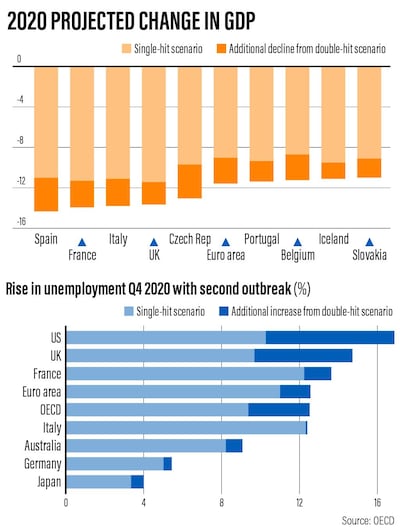Global economic output is forecast to plummet 7.6 per cent this year in absence of a Covid-19 vaccine to control the pandemic, and unemployment in some of the world’s largest economies could more than double to about 11 per cent, according to the Organisation for Economic Cooperation and Development (OECD).
However, if a second wave of the coronavirus pandemic is avoided with the help of a vaccine, global output is expected to fall 6 per cent in 2020 and unemployment in the OECD’s 37-member countries will climb to 9.2 per cent from 5.4 per cent in 2019, the Paris-based global intergovernmental body said in its latest economic outlook.
The OECD said it has taken the “unusual step of presenting two equally likely scenarios”, given the uncertainty about the prospect of a vaccine becoming widely available this year. It expects the global economy to bounce back 2.8 per cent in 2021.
“This is the most uncertain and dramatic outlook since the creation of the OECD," Laurence Boone, OECD's chief economist, said at a web media conference on Wednesday.
"We have never been confronted by such uncertainties ... so we can’t make projections as we usually do."
In both scenarios, the recovery, while initially rapid, will take a long time to bring output back to pre-pandemic levels, and the crisis will leave long-lasting scars - a fall in living standards, high unemployment and weak investment, the OECD said.
Job losses in the most affected sectors, such as tourism, hospitality and entertainment, will particularly hit low-skilled, young, and informal workers.
The drop in GDP is by far the largest the OECD has predicted in 60 years since its inception, Angel Gurria, OECD secretary general, said during the web conference.
"One particular imperative for limiting the worsening of inequalities is to prevent unemployment getting stuck at very high levels. That would set back a whole generation of young people and undermine their long-term potential," he said.
The OECD economic forecast is more pessimistic than both the World Bank and International Monetary Fund. The World Bank on Tuesday said it expects the global economy to shrink 5.2 per cent, slipping into the deepest recession since the Second World War. It expects per capita output to decline in the largest fraction of economies since 1870. In April, the IMF projected global output to shrink 3 per cent in 2020 and recovery to begin only in 2021.
The coronavirus outbreak has claimed more than 411,000 lives and infected more than 7.2 million people worldwide, according to Johns Hopkins University, which is tracking the outbreak. Both global infections and morality rate are likely being "significantly underestimated", Mr Gurria said.
Economies around the world are now gradually opening up four months after the World Health Organisation declared Covid-19 a pandemic, despite a rise in infection rates in some of the emerging markets. Governments and global pharmaceutical companies are pouring in billions of dollars to quickly develop a vaccine.
However, it remains to be seen if a vaccine will be available before the end of this year to begin a global inoculation programme, which is key to reviving the travel and tourism sector and embattled aviation industry.
The OECD said the economic impact of strict and relatively lengthy lockdowns in Europe will be particularly harsh. Euroarea GDP is expected to plunge 11.5 per cent this year if a second wave breaks out, and over 9 per cent even if a second hit is avoided. The US economy the world’s largest, is forecast to contract 8.5 per cent and 7.3 per cent, and in Japan, 7.3 per cent and 6 per cent, respectively.
Emerging economies such as Brazil, Russia and South Africa face particular challenges of strained health systems, adding to the difficulties caused by a collapse in commodity prices. These economies are expected to shrink 9.1 per cent, 10 per cent, and 8.2 per cent, respectively in case of a double-hit scenario. They will contract 7.4 per cent, 8 per cent and 7.5 per cent in case of a single hit, respectively.
China’s and India’s GDPs will be relatively less affected, with a decrease of 3.7 per cent and 7.3 per cent respectively in absence of a vaccine and 2.6 per cent and 3.7 per cent in case a vaccine is found this year, according to the OECD report.
Global policymakers need to move decisively as they are now faced with a "daunting challenge" of quickly and fully reviving the global economy. Policies they implement today will "shape" the decades ahead, Mr Gurria said.
Global trade, he said, was already stagnating before the pandemic hit and it is now expected to drop as much as 12 per cent this year.
"Trade, more trade and even more trade" is needed for the revival of global commerce and both the US and China should work to defuse tensions, which have already cost the world economy 1-1.5 per cent of growth before Covid-19 hit, Mr Gurria said.
"This pandemic has already damaged the economy, firms and peoples' well being, and we need to make sure that this harm does not become long lasting," Ms Boone said.



